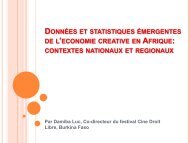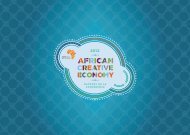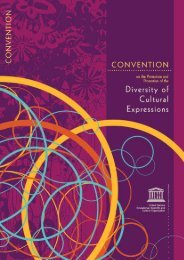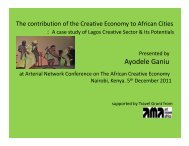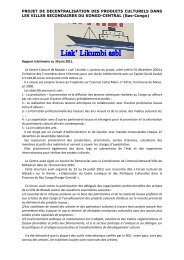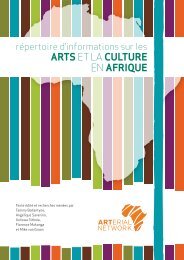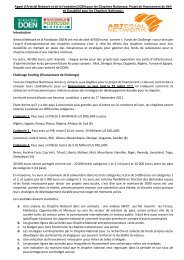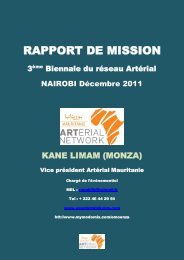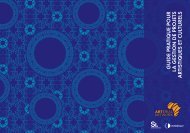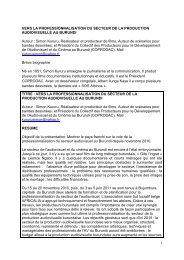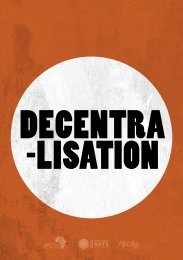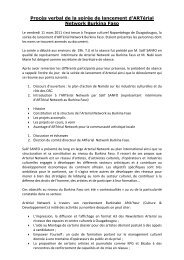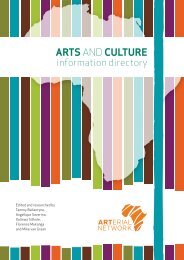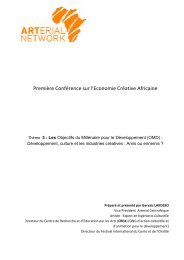ACE report - ENG - Digital FA - ACEC2013 African Creative ...
ACE report - ENG - Digital FA - ACEC2013 African Creative ...
ACE report - ENG - Digital FA - ACEC2013 African Creative ...
- No tags were found...
Create successful ePaper yourself
Turn your PDF publications into a flip-book with our unique Google optimized e-Paper software.
CONTENTSForeword<strong>ACE</strong> 2012Arterial Network<strong>ACE</strong> 2012 Conference Organising CommitteeConference Speakers<strong>ACE</strong> 2012 OPENINGConference Theme SongDay 1Key Note SessionPanel Discussion234671212141622Day 1Round Table DiscussionDAY 2Key Note SessionPanel Discussion25323436DAY 2Round Table Discussion<strong>ACE</strong> 2012 DelegatesAcknowledgments394658Contact4 5
ARTERIAL NETWORKArterial Network is a dynamic networkof individuals, organisations, donors,companies, and institutions engaged in the<strong>African</strong> creative sectors.NATIONAL CHAPTERS:Since the adoption of the ConstitutionalFramework in 2009, national chapters areat the core of Arterial Network’s structureas they are the primary means to changeworking conditions and deliver real andsubstantial benefits to artists on the ground.Arterial Network is now structured as acontinental network of national networks.Forty National Chapters have been officiallylaunched to date:Arterial Network is supported by:NORTHERN AFRICA: Algeria, Egypt,Mauritania, Morocco and TunisiaWEST AFRICA: Benin, Burkina Faso, CapeVerde, Côte d’Ivoire, Gambia, Ghana, Guinea,Liberia, Mali, Niger, Nigeria, Senegal, SierraLeone, and Togo,EASTERN AFRICA: Ethiopia, Kenya, Rwanda,Seychelles, Sudan, Tanzania, Uganda, andMauritiusTHE EUROPEAN UNIONCENTRAL AFRICA: Cameroon, Central <strong>African</strong>Republic, Chad, Democratic Republic ofCongo, Gabon, and Republic of the Congo(Congo Brazzaville)SOUTHERN AFRICA: Malawi, Mozambique,Namibia, South Africa, Swaziland, Zambiaand Zimbabwe4 5
<strong>ACE</strong> 2012 CONFERENCEORGANISING COMMITTEECONFERENCE SPEAKERS<strong>ACE</strong> 2012 Conference OrganisingCommitteeThe Second <strong>African</strong> <strong>Creative</strong> Economy wasorganised by Arterial Network in partnershipwith ADAFEST (official representative ofArterial Network Senegal), Platforme Art andCulture and Arterial Network Mauritania.ADAFESTL’Association des Diffuseurs Artistiqueset Festivals du Sénégal ADAFEST is anassociation of various cultural organisationsin Senegal namely, Africa Fête, AC Consulting,Banlieue Rythmes, l’Ecole des sables, FespopLouga, Fest’Art, le Festival du film de Dakar,Festival Images et Vie, Festival de Thionkessyl,Groupe 30 Afrique, Kaay Fecc, la Bouchede l’Afrique, Optimiste Produktions, Palaisdes Arts de Thiès, Synergie Contemporaine,Zénith Productions, Zhu Culture.Plateforme Art & Culture duSenegalPlateforme Art & Culture was launchedby Senegalese cultural representativesin November 2011 after a Culture andEmployment seminar organised by La AgenciaEspañola de Cooperación Internacionalpara el Desarrollo (AECID) and ADAFEST inDakar. It is open to all professional actorsand cultural organisations based in Senegaland encourages them to work together as asingle integrated structure in order to meetthe professional needs of its members.Arterial Network MauritaniaThe Arterial Network Mauritania Chapterwas launched in 2011. The Chapter works inpartnership with a local association of culturalworkers: Le Réseau des Acteurs et OpérateursCulturels Mauritaniens (RACOMI), which waslaunched in March 2012.FIRST NAME SURNAME ORGANISATION COUNTRYAadelAbabacarEssaadaniDialloRacines/ Arterial Network/CasamemoireDirection de la Planification(Ministère des Finances)MoroccoSenegalAghan Odero Agan Kenya Cultural Centre KenyaAlexandre Agra SOMMOS Brazil BrazilAvril Joffe CAJ (Culture, Arts and Jobs) South AfricaBilly Kahora Kwani Trust KenyaBrahim Sakho Croissance Acceleree SenegalCheikh Ngaïdo Ba CINESEAS SenegalGuiomar Alonso UNESCO SenegalEddie Hatitye Music in Africa ZimbabweEvaristo Madime CEDARTE MozambiqueFlorence Mukanga University of Zimbabwe ZimbabweGiulia Paoletti Wiki Africa SenegalHamadou Tidiane SY Ouestaf News SenegalHermion Boko-Koudakossi ECOBENIN BeninIbrahimaAyaFonds des Prix littéraires du Mali(Association)Ibrahima Sow Telegiros Africa SenegalJoseph Gaylard VANSA South AfricaMali6 7
OPENING CEREMONY10 11
<strong>ACE</strong> 2012 OPENINGThe opening ceremony of the <strong>African</strong> <strong>Creative</strong>Economy Conference comprised of aninspiring panel of speakers. Panelists included:Hon. Abdoul Aziz Mbaye, Senegalese Ministerof Culture; Abdoulaye Koundoul, President of<strong>ACE</strong> 2012 Local Organising committee; KorkorAmarteifio, Director for the Institute of Musicand Development and Arterial NetworkChair; Ouafa Belgacem, Secretary General ofArterial Network; and Ann Therese Ndong-Jatta, Director of UNESCO in Dakar.Conference Theme SongIn support of <strong>ACE</strong> 2012, Arterial Networkmember organisation in Kenya, Ketebul Music,sponsored and produced ‘Free Africa’ as the2012 <strong>ACE</strong> theme song and accompanyingradio promotion ads. Ketebul artist and guitarvirtuoso, Eddie Grey composed, arranged andrecorded the theme song which emphasisesthat it is the time for Africa to stand on itsown two feet. He was joined on vocals bytwo Kenyan artists, Olith Ratego, and nyatitiplayer Rapasa Nyatrapas Rapwapwa, as wellas a Madagascan-based singer Favor.‘FREE AFRICA’ REVIEWS“Great guitar works and instrumentationgenerally. Catchy chorus, the song will growon you.”Dr. Kolade (Nigeria/South Africa)“A great wake up call to the entirecontinent and international community,Beautiful message of hope for all.Timelessarrangement and sheer vocals by theKetebul movement.’’Thabiso Blak Mashaba (Botswana)12 13
DAY 114 15
DAY 1 | Key Note SessionSession Moderator: Gugu DlaminiDirector of Siphila Nje Drama Society / Swazi Women in Theatre, SwazilandKEY NOTE 1: DEVELOPMENT OF NEW MODELS OF NORTH-SOUTHCULTURAL COLLABORATION: NEGOTIATING RESOURCEBY AGHAN ODERODirector, Kenya Cultural CentreThe South needs to actively engage inrenegotiation of frameworks under whichcollaborative engagements are carried out.We, as the South, should at all times seekto raise issues of relationship building. Thisshould cover the entire array of definingresources, valuing such resources, agreeingon longevity of partnerships and the depth ofinvolvement.Instead of programmatic or even projectcircles of engagements emphasising activity-based funding arrangements, argumentsfor strengthening institutions in terms ofgovernance, capacity and catalysing energiesshould be given priority. Activities thenshould be designed to run across multiplescopes of audiences. This way, sustainabilitycan be nurtured without being tied to briefperiods of funding assistance. Ways andmeans of finding contributory valuation ofnon-monetary input variables, separate fromhard currency funding, should be exploredand used extensively.“We need to firstconsolidate South - Southcollaboration as a possiblesubsequent spring-boardto forging the North-Southpartnership”Aghan OderoKenya Cultural CentreKenya16 17
DAY 1 | Key Note SessionKEY NOTE 2: SOUTH-SOUTH CULTURAL COOPERATION:NEW ACTORS/NEW CHALL<strong>ENG</strong>ESBY EVARISTO MADIMEExecutive Director, CEDARTE, MozambiqueNumerous benefits of South-South cooperationinclude:Creation of opportunities for countries to expand the markets fortheir skilled nationals, technologies and products while makingrelevant and affordable technologies available to receivingcountriesIncreased cooperation among stakeholders to achieveinternationally agreed upon goals such as the MillenniumDevelopment GoalsIncreased country ownership of the development agenda that ismore aligned with participants’ priorities and needsDevelopment of the capacity of those involvedExpanded professional networksIncreased economies of scale through less duplication of effortPromotion of greater sustainability, as the process is typicallyadapted to local contexts and capacities“Cooperation among countries andstronger partnerships with internationalorganisations have proven to be animportant strategy for building technicalforums that promote dialogue, the jointconstruction of knowledge and theexchange of experience, in an attemptto produce synergies in the search forsolutions to issues on the agendas ofgovernments across the world.”Evaristo MadimeCEDARTEMozambique18 19
DAY 1 | Key Note SessionKEY NOTE 3: BUILDING AND STR<strong>ENG</strong>THENING INTRA-AFRICANMARKETS AND MODELS OF EXCHANGE FOR CREATIVE INDUSTRIESBY VIYE DIBAArts Lecturer at Dakar University, SenegalSession SummaryThe key note session called for North-Southrelations based on new criteria which musttake into account the needs and priorities ofthe cultural sector in developing countries.There was also emphasis on the need topromote South-South cooperation andharmonisation of economic policies asinherent to the equilibration of North-Southcultural exchange and trade. The need forways to allow <strong>African</strong> cultural productsto find adequate markets regionally andinternationally, focusing more in buildingaudiences and advocacy to encourage<strong>African</strong>s to be the primary consumers of theircultural goods and services was identified.The session also called for more lobbying andadvocacy within the south-specific regionalcommunity organisations BRICS, ECOWAS,SADAC and IBSA to ensure the allocation ofresources to the arts and culture sector.Finally, the session called for relationshipbuilding with the media, best practices andlessons learnt to be shared between <strong>African</strong>states and with other regions so as to ensurepromotion of <strong>African</strong> cultural products.“If we eliminate ourdifferences, there will benothing left to trade. Artistshave no envy of othereconomic players, and wemust create a sector whereeach artist or entrepreneurcan find a niche.’’Hon. Abdou Aziz MbayeMinister for CultureSenegal20 21
DAY 1 | Panel DiscussionICT FOR CULTURESession Moderator: Belisa Rodrigues, General Manager, Arterial NetworkPanelists1 Eddie Hatitye, Music In Africa, South Africa2Maud de la Chapelle, Sudplanète, France3Giulia Paoletti, Ph.D.in Art History at Columbia University, Wiki Africa, Senegal4Hamadou Tidiane SY, Founder Ouestaf News, Director E-jicom , SenegalSession Summaryreliance on heavy funding. It relies on aninformation crowd-sourcing model wherebyartists create online portfolios and updatetheir own information regularly. It has apartnership model, and is currently linkedto the Arterial Network Country Chapters.The website aims to increase culturalconsumption of <strong>African</strong> creative goods andservices. Sudplanète is currently workingon innovative marketing tools for artists andarts organisations to use, for example, a freemicro website package. Visit www.spla.proWikiAfrica is a project launched by letter27Foundation and the Africa Centre to createmore Africa-created content for Wikipedia.Eighty four percent of all English Wikipediainformation is generated by the GlobalNorth. WikiAfrica aims to reduce thisstatistic by linking with institutions in Africawho are able to feed information from theircountries into the site, thereby spreadingknowledge, going beyond the North-South,leveraging passionate enthusiasts, andincreasing traffic to the site. Wikipedia has apartnership with <strong>Creative</strong> Commons and hasalready linked institutions such as Doula’Artin Cameroon who agreed to make available600 images under <strong>Creative</strong> CommonsLicense enabling them to reach a wideraudience. A similar partnership occurredwith Chimurenga (pan-<strong>African</strong> magazine)which has created an online library focusingon <strong>African</strong> content, texts, interviews andmore, all available on Wikipedia.The panel opened discussions that assessedthe relevance and viability of ICT applicationsand models in the distribution, promotionand marketability of <strong>African</strong> creative andcultural goods and services. Given thataccess to arts and culture information on thecontinent is still hard to come by, informationportals are increasingly important accesspoints to expand the market for theconsumption of <strong>African</strong> creative andcultural goods and services. Presentationswere made by speakers who are currentlybuilding information portals geared towardsthe arts and culture sector in Africa. Otherinteresting views of ICT for culture includedcultural innovation through employing ICT inthe creation process thereby leading to newforms of expression, sharing and reflecting.The Music in Africa (MIA) platform aimsto enhance access to music knowledgeand related music information on thecontinent. Innovative tools include the‘<strong>African</strong> Music Discovery Tool’ which aimsto aggregate existing music download intoone space. It is currently being funded bySiemens Stiftung, however the MIA teamis currently working on its sustainabilitymodel which includes creating onlinebusinesses, in support of the music sector.Visit www.musicinafrica.net soon.The Sudplanète information portal has raised<strong>African</strong>, Caribbean, Pacific Group of States(ACP) funds for its next phase of developmentand hopes to develop relevant tools for easeof information gathering in order to decrease22 23
DAY 1 | Round Table DiscussionCONCEPTS OF CREATIVE CITIES IN AFRICAN CONTEXTSSession Moderator: Jenny Mbaye, Post doctorate Researcher at University of Cape TownPanelists1 Oumar Ndao, Director or Culture and Tourism at City of Dakar, Senegal2Aadel Essaadani, Director, Casamemoire, Morocco3Roy Ngardobe, Journalist, Arts critic , Actualité–Eco, Chad4Korkor Amarteifio, Director, Institute for Music and Development, Ghana5Hermione Boko Koudakossi, Monitoring and Evaluation Manager, Ecobenin, BeninSession SummaryThe ‘<strong>African</strong> City of Culture’ should not be amere copy and paste of the European modelof ‘European City of Culture’ but the resultof a creative engagement with the particularconfigurations, needs and potential of <strong>African</strong>cities and villages.The panel provided the opportunity for arich interaction to reflect on the applicabilityof the ‘<strong>Creative</strong> City’ concept to the <strong>African</strong>context where over 60% of the populationlives in rural areas. Cities were conceived,in the scope of this panel, in a very broadsense to also include villages, towns andother experimental projects. Emphasis wasmade on the effects of rapid urbanisationin Africa, the impact of conflict and war on<strong>African</strong> countries and cities and how to bettermanage and sustain cities.The session examined practical ways of howcreative cities would be sustained in the<strong>African</strong> context. These included sharingexperience; by looking at ways in which <strong>African</strong>cities assert their creativity and flaunt theirstrengths, notwithstanding the realities facingthis sector, but also, looking at strategies tosupport the <strong>African</strong> creative sector. The panelalso established itself as a space for debateto identify links, opportunities and possiblepartnerships between cities in Africa.References were made to the <strong>Creative</strong>Cities Network initiated by UNESCO. The<strong>Creative</strong> Cities Network has 34 membercities around the world in seven creativeindustry fields. The city of Aswan in Egyptis the only <strong>African</strong> city in the Network. Thecity invites artists from all over the worldand hosts the International Symposiumfor Sculpture in order to revive the art ofsculpture from the time of the Pharoahs.It was appointed as UNESCO’s first City ofCrafts and Folk Art on 1 September 2005.24 25
DAY 1 | Round Table DiscussionCONCEPTS OF CREATIVE CITIES IN AFRICAN CON-Mainstreaming <strong>Creative</strong> Cultural Industries as CriticalElements in <strong>African</strong> National Economic PlanningSession Moderator: Brahim Sakho, SCA (Stratégies de Croissance Accélérée), SenegalPanelists1 Mr Ababacar Diallo, Direction de la Planification Nationale2Imruh Bakari, Filmmaker/Writer, Senior Fellow – Knowledge Exchange,University of Winchester, UK3Mercedes Giovinazzo, Director, Interart, Spain“Our goal is to reacha point where thecreative economyconstitutes a criticalrole in each country’seconomic plan.’’Korkor AmarteifioInstitute for Music DevelopmentArterial NetworkGhanaSession SummaryWithin the <strong>African</strong> context, mainstreamingculture within national economic planscomes with a lot of challenges. It requires asound knowledge of the sector, effective andefficient coordination among governmentbodies and the assimilation of the socialdimension of culture as well as humanrights and creative freedoms in nationalplanning processes. Partnerships with privatecompanies with corporate social responsibilityprogrammes can further contribute to socialand economic development. There is alsoneed for investment in art education andlink education programmes with the creativesector labour market.Within the last decade there have beensignificant steps taken to engage withthe issues of the creative economy andits potential for economic development.Significantly, a momentum has developedwith the urgency to ‘mainstream cultureand the creative industries’ in nationaleconomic planning. This is currently a focusof concern for government and policymakersin Africa. A number of studieshave been produced and along with theconclusions and recommendations of twoconsultative workshops, the critical issuesnoted, constitute a significant challenge tothe realisation of the desired objectives.26 27
Festival sur le Niger, MaliMamou Daffé is the founder of River NigerFestival. The event has turned Ségou into acreative city that has an impact on peopleand development. Some 50 thousandpeople attended the festival in 2010 and2012, including over 7 thousand foreignersfrom about 30 different countries. Thefestival has made more than C<strong>FA</strong> francs 3billions in the hotel, craft, food, bars, andtrade sectors. Over 7 thousand jobs werecreated, including close to 400 direct ones.Ségou and the city of Richmond in the USAhave been twinned. Portugal, Mexico andSenegal are developing partnerships withthe festival. An advocacy campaign to saveriver Niger is also on. Self-esteem has grownamong citizens as they interact with peoplewho come from far and near.Co-prodac, BurundiSimon Kururu, 62, is a filmmaker andcommunication lecturer from Burundi. Theaward-winning cartoonist delivered a paperdubbed “Toward the Professionalization ofthe Audiovisual Landscape in Burundi”. Thesector is still at initial stage with just onefull-length feature film in history. The delayis blamed on the lack of a national policy,skilled professionals, technical equipment,and seasoned marketers.Burundian filmmakers gathered in Bujumburain 2010 and 2011 to address the crisis thanksto technical and financial assistance fromAfricalia. 2 workshops helped them to setup an association of filmmakers, and devisea strategic plan as immediate result. Theinitiative has been catching the interest ofdonors. Many low-budget projects have beensponsored in order to build the capacity offilm technicians. Burundi is now witnessingthe production of its second full-lengthfilm. The association has already hosted 3film festivals.Some of its movies have been screenedat FESPACO, the largest film festival onthe continent.“It was the cooperation of two entitiesthat allowed for the conference tocome to life: Arterial Network Senegaland Arterial Network Mauritania. Theconference serves as a platform forfinding strategies to promote cultureand to push political players tocontribute to the development of thecreative sector.’’Ouafa BelgacemArterial NetworkTunisia30 31
DAY 2 | Key Note SessionSession Moderator: Igo Lassana Diarra, Arterial Network West <strong>African</strong> Regional SecretariatKEY NOTE 1: EMERGENT DATA AND STATISTICS OF THE AFRICANCREATIVE ECONOMY: NATIONAL AND REGIONAL CONTEXTSBY LUC DAMBIMBAUnited Nations Development Programme (UNDP) Semfilms, Burkina FasoKEY NOTE 2: RELATIONSHIP BETWEEN CULTURAL INDUSTRIES ANDCULTURAL POLICIES IN AFRICA: ANALYSIS OF GOVERNMENTALINITIATIVES AND RHETORICBY STEPHEN ATWOKITororo Youth Platform, UgandaPaper Presented by Faisal Kiwewa on behalf of AtwokiSession SummaryCultural policies in Africa should give explicitrecognition and priority to the reclaimingand production of traditional forms ofartistic expressions and adapting them tothe mainstream modern artistic industry.Secondly, they should prioritise projectsdeveloping sectoral mapping and statisticaldata to stimulate, inform and guide policyformulation, implementation and monitoring.Lastly, policies and programmes of culturalindustries should give priority to networking,information sharing, capacity building andthe cross-border interaction of practitionersto build a professional constituency whichcan demand and monitor policy. This willattract local popular demand, win politicalwill and achieve effective implementationand monitoring.Limitations to Cultural Policy Implementation in AfricaThe concept ‘cultural industry’ is a relatively new concept which hasnot taken root in the consciousness of the grassroot communities inAfrica to demand policy.Existing policies do not originate from local popular demand butrather from experts, informed by international instruments andstandards.Our planning is usually centred on duplicating international standardsrather than confronting local realties.The existing policies on cultural industries do not customiseterminologies and priorities into the unique regional and localconditions and needs which the <strong>African</strong> context presents.The existing policies on cultural industries lack sufficient politicalwill due to a lack of popular demand and therefore lack the drive tocomplete a list of priorities.There is a lack of sufficient statistical data and information tostimulate and guide policy formulation, implementation andmonitoring.We have immobilized cultural industry practitioners and a civil societywith no capacity to create demands and engage policy makers topush demands into the policy agenda.34 35
DAY 2 | Round Table DiscussionCritical Issues in Developing Cultural Policiesfor <strong>Creative</strong> Industries: <strong>African</strong> Case StudiesSession Moderator: Imruh Bakari, Filmmaker, Writer, Senior Fellow - University of WinchesterPanelists1 Prof Francis Gichuru, Founder and Chairman of <strong>African</strong> Cultural RegenerationInstitute, Kenya2 Patrick Mudekereza, Visual Artist, Director of Picha ASBL, DR-Congo3Joseph Gaylard, Director of Visual Arts Network of South Africa (VANSA), South Africa42Emile Raguidissida Zida, Coordinator Pépinière de Ouagadougou,Programme ARPEM, Burkina-FasoSession SummaryThe panel discussed challenges that constitutean impediment to the development of aviable cultural industry in Africa. While theurgent need for cultural policies in Africawas a common consensus, the followingchallenges were identified:The need for further research on the creativeindustries in AfricaA better understanding of the dynamics ofthe sector specific to <strong>African</strong> countriesThe need for clarity and commonunderstanding of the creative industries’terminology – its meaning and usageThe session also identified the big need forpolicy research study to be conducted bydifferent institutions, for training interventionsto be developed, incentive schemes to becreated and marketing strategies promotedto improve and strengthen creative industriesin the country. The government ought toidentify, recognise and acknowledge theeconomic role played by the creative industryby establishing funding programmes towardsthis sector as a way of diversifying revenuecontribution towards the GDP. It is necessaryfor these to be aligned to an overarchingstrategy and developed in such a way so as toachieve effective outcomes for the industrywithout duplication and confusion.38 39
Thursday July 3 rd , 2008 - IEEE ICALT 2008 Detailed programParallel session 8.d: Educational technologies for new generations IIChair: Pilar Sancho225 S Define and Visualize Your First Programming LanguageMikko-Jussi Laakso, Erkki Kaila, Teemu Rajala, Tapio SalakoskiBuilding 6Room 379 S Enhancing a free-text Adaptive Computer Assisted Assessment system withself-assessment featuresIsmael Pascual-Nieto, Diana Perez-Marin, Mick O’Donnell, Pilar Rodriguez345 F Primary preschool experiences with computers in the classroomMónica Trella, Beatriz Barros, Ricardo Conejo120 F Towards The Automatically Semantic Scoring in Language ProficiencyEvaluationJie Jiang, Bo Xu30 F Using Learning Styles and Preferences to Incorporate Emerging E-learningTools in TeachingNauman Saeed, Yun Yang16:30-18:30Parallel session 8.e: Transforming learning through technologies VChair: Margus Pedaste15 F The Robinson Program: An interdisciplinary Robotic Program for Academicand Pre-Academic EducationSabina Jeschke, Lars Knipping, Marcus Liebhardt, Fabian Müller, UrsulaVollmer, Marc WilkeBuilding 6Room 2296 S A Semantic Infrastructure to Support a Federation of Agricultural LearningRepositoriesNikos Manouselis, Alberto Abian, Jesus Soto Carrion, Hannes Ebner, MatthiasPalmer, Ambjorn Naeve192 F Integrated Copy-Paste Checking: Design and ServicesNarayanan Kulathuramaiyer, Bilal Zaka, Denis Helic374 S Proactive Reflection in the Development of Nursing Students’ ClinicalJudgmentJames L. Bowen, Carole McKenzie, Kim Bruce127 S Quality-oriented Evaluation of E-learning-based ExperiencesFélix Buendía, Elena Ejarque Antonio HervásThe 8th IEEE International Conference on Advanced Learning Technologies
DAY 2 | Round Table DiscussionCREATING AND DISSEMINATING CREATIVE GOODS ANDSERVICES FOR CULTURAL EXPRESSION TRANSMISSIONSSession Moderator: Maggie Otieno, Arterial Network East Africa Regional Secretariat, KenyaPanelists1 Billy Kahora, Managing Editor, Kwani Trust, Kenya2Samuel Kolawole, Chairman, APNET, Nigeria3Kwesi Owusu, <strong>Creative</strong> Storm Ghana & AFRIFESTNET, GhanaSession SummaryThe panel discussed the importance ofbalancing the cultural values and commercialobjectives of creative goods and servicesand how artists can enhance the economicpotential from the creative industries. Thereis a need to engage local business to helpenhance the quality of local products in themarket and the need to continue localisingproducts in order to gain support from themass populace.Whilst donors have played a major role inbuilding networks, sustainability of theseproducts needs to be pegged on the localconsumption and support of the communities.It is evident that local participation hasimproved in many scenarios but leveraginglocal business could spell good tidings formany local art organisations.44 45
CONFERENCE DELEGATESFIRST NAME SURNAME ORGANISATION COUNTRYFIRST NAME SURNAME ORGANISATION COUNTRYAbdelmahmoud Abdelgadir Karar AN Sudan SudanAbderhaman Salem La maison des cineastes MauritaniaAbdoul Aziz Cisse Direction de la Cinématographie SenegalAbdoul AzizDiengConseiller Technique n°1 / MinistCultureSenegalAbdoulaye Dia SenegalAbdoulaye Koundoul Plateforme Arts et Culture / PECCS SenegalAbdoullahi Diop ADAFEST SenegalAboubacar Demba Cissokho ADAFEST SenegalAboubacar Diallo ADAFEST SenegalAdri Herbert Vryfees South AfricaAïcha Deme Deme Agen Dakar SenegalAïssata Sow Sow ADAFEST SenegalAlaeddine Ayoub Ayoub AN Tunisia TunisiaAlassane Babylas Ndiaye ADAFEST SenegalAlassane Cisse ADAFEST SenegalAlioune Babee Ndiaye WAAW STUDIO SenegalAlioune Badiane Consultant Culturel / Délégué SenegalAlpha Sadou Gano Direction de la Cinématographie SenegalAmadou Saalum Seck CINESEAS SenegalAnthony Lankester National Arts Festival South AfricaAntoinette Correa APNET ZimbabweAntonio Gucciardo Interarts SpainAntonio Perez-Hernandez Ambassade Espagne au Sénégal SenegalAuguste Gbogbo Centro Kult International CARBabacar Baye Ndiaye Artérial Network / Mauritanie MauritanieBabacar Sarr FESFOP SenegalBigué Bop ADAFEST SenegalBjorn Maes Gaylard Africalia BelgiumBoubacar Obèye Thioye ADAFEST SenegalBrahim El Mazned Festival Timitar MoroccoBrett Pyper Kuns Onbeperk - Arts Unlimited South AFricaJaqueline Ndiaye (BSDA) ADAFEST SenegalCatherine Mujomba Go Down Arts Centre KenyaCécile Rata ADAFEST / AFRICA FETE SenegalCheikh Ngaido Ba SenegalCheikh Saadbou Tahana Artérial Network / Mauritanie Mauritanie46 47
CONFERENCE DELEGATESFIRST NAME SURNAME ORGANISATION COUNTRYFIRST NAME SURNAME ORGANISATION COUNTRYCheikh Sadibou Sarr FESPOP SenegalChemsaddine Mechri Arterial Network Tunisia TunisiaChristine Oumy Ndiaye Plateforme Art & Culture SenegalDaniel Gomes Plateforme Arts & Culture / AMS SenegalDélégation Wallonie Bruxelles ADAFEST SenegalDorine Rurashitse Africalia BelgiumDounia Benslimane Casamemoire MoroccoEl Hadji Sagna Kande Plateforme Art & Culture SenegalEmile Raguidissida Zida La Rentrée litteraire du Mali Burkina FasoErnest Mannah London Mining Company Limited Sierre LeoneEspera Donouvossi AN Benin/S.AfricaFaisal Kiwewa Bayimba Cultural Foundation UgandaFarrah Nurani Samosa Festival KenyaFatou Kiné Sene Journaliste à Walfadjri SenegalFedilis Duker Abuja International Film Festival NigeriaFernand Ateba Ossende AN Cameroon CameroonFrancisGichuru<strong>African</strong> Cultural RegenerationInstituteKenyaFranz Schmidjell VIDC AustriaGertrude Flentge DOEN NetherlandsGoretti Kyomuhendo <strong>African</strong> Writer’s Trust UKGregory Mwendwa HIVOS KenyaGugu Dlamini Siphila Nje Drama Society SwazilandGuiomar Alonso Cano UNESCO SenegalHege Aasgaard MIMETA NorwayIba Gaye Massar Plateforme Art & Culture SenegalIbrahima Senghor ASPEC SenegalIdriss Nor DOEN NetherlandsJason Kibishwa DRC/AFRICALIA DRCJean Jose LwembaCentre Culturel de Matadi ‘Liak’Likumbi’Jeannette Ly Plateforme Art & Culture SenegalJenny Mbaye <strong>African</strong> Centre for Cities South AfricaJens Cording Siemens Stiftung GermanyJérôme Diouf Plateforme Art & Culture SenegalJoseph Kimani Journalist KenyaJosephine Igberaese National Troupe of Nigeria NigeriaJulien N’kolo Attac Gabon GabonDRC48 49
GALA DINNER54 55
GENERAL COUNCIL56 57
ACKNOWLEDGMENTS<strong>ACE</strong> 2012 CONFERENCE TEAMARTERIAL NETWORK TEAMPresident de ADAFEST: M. Ousmane FayeProgramme Co-ordinator: M. Abdoulaye KoundoulProgramming: Ouafa Belgacem, Matar NdiayeScientific Committee Co-ordinator: Oumar SallAccommodation and Delegates Logistics: Laurence Maréchale,Espera DonouvossiFinance: Annie Hoosain, Daba Sarr, Belisa RodriguesCommunications and Marketing: Nancy Onyango, Lisa Eller, Daniel Gomès,Cécile RataSecretariat Services: Alassane Babylas Ndiaye, Mouhamed Touré BayanoTransport and Logistics: Sacou NdiayeCartoons: Jason KabiswaOuafa Belgacem: Secretary GeneralIgo Lassana Diarra: West <strong>African</strong> Regional SecretariatMaggie Otieno: East <strong>African</strong> Regional SecretariatBelisa Rodrigues: General ManagerEspera Donouvossi: Project Manager/ TranslatorAnnie Hoosain: Office Manager/BookkeeperNancy Onyango: Communications ManagerLisa Eller: InternPierre Pasquier: InternPhotography: Marie Boehm, Agen DakarReport Layout and Design: Pulling RabbitsVolunteers from Arterial Network Mauritania, ADAFEST, Plateforme Art &Culture and Arterial Network National Chapters and Senegal58 59
KINDLY SUPPORTED BYRépublique du Sénégal60 61
CONTACT USArterial NetworkAddress: 25 Commercial Street | Cape Town | 8001 | South AfricaTel: +27 21 465 9027Email: info@arterialnetwork.orgwww.arterialnetwork.org62 63



